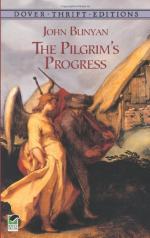|
This section contains 165 words (approx. 1 page at 400 words per page) |

|
1. It is often said that Bunyan's characters are universal; that is, they are human types that can be found in all times and places. Can you find any modern analogues to figures like Talkative, Ignorance, Valiant-for-truth, and Feeble-mind?
2. Given that Christian and Christiana must journey over essentially the same terrain in the two parts, how does Bunyan avoid simply repeating himself in the second part?
3. In what sense is The Pilgrim's Progress dreamlike? Why is a dream a suitable medium for an allegory?
4. Why do you think Bunyan chose to end the first part with the damnation of Ignorance, a relatively minor character, rather than the arrival of Christian in the Celestial City?
5. The Pilgrim's Progress consists of a series of dialogues. Which ones seem more like conversations to you? Which seem less like conversations? Why?
6. Heroic and humble are two adjectives that may...
|
This section contains 165 words (approx. 1 page at 400 words per page) |

|




